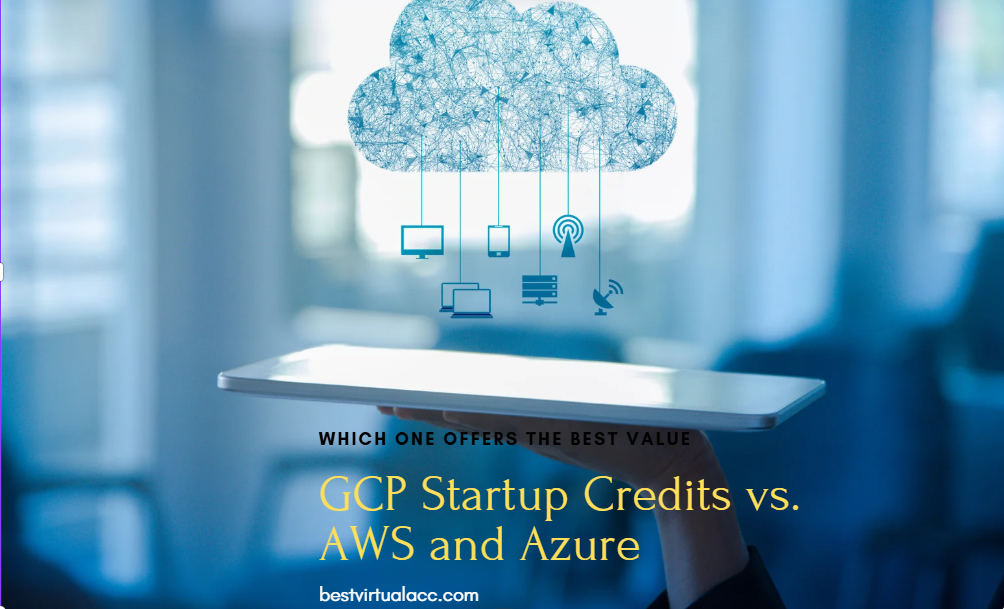When you’re launching a startup, one of the most important decisions you’ll face is choosing the right cloud platform. With so many options available, it can be tough to figure out which one offers the most bang for your buck.
GCP (Google Cloud Platform), AWS (Amazon Web Services), and Azure (Microsoft’s Cloud Platform) all have great features, but they come with different startup programs.
These programs offer cloud credits that can help reduce the initial costs of running your business.
In this article, we’ll dive deep into GCP Startup Credits and compare them with AWS and Azure to help you decide which one offers the best value.
By the end of this read, you’ll have a clearer understanding of which cloud provider can provide the most cost-effective solution for your startup needs.
What Are Startup Credits and Why Do They Matter?

Cloud startup credits are financial credits given to new businesses, usually in the form of free access to cloud services, to help reduce the initial cost burden.
These credits can be used for computing, storage, machine learning, database services, and more. They allow startups to experiment and build without worrying about the cost of infrastructure.
When you’re starting, every penny counts, and using these credits wisely can make a significant difference in your initial cash flow. But with different cloud providers offering different types of startup credits, how do you know which one will give you the most value?
Let’s compare the startup credits provided by GCP, AWS, and Azure, and examine which cloud service offers the best value for new businesses.
GCP Startup Credits: Google Cloud’s Offering
Google Cloud Platform (GCP) is known for its cutting-edge technology and flexible pricing. The startup credits offered by GCP are designed to help startups scale efficiently without initial financial strain.
How Much Are GCP Startup Credits?
GCP provides a significant amount of credit to startups that are part of their Google Cloud for Startups program. Eligible startups can receive up to $100,000 in credits, depending on their business’s eligibility and stage of development.
These credits are valid for up to 12 months and can be used across many Google Cloud services, including compute instances, storage, databases, machine learning, and analytics.
Benefits of GCP Startup Credits
Wide Range of Services: GCP credits can be used for various services like Google Kubernetes Engine, BigQuery, and Firebase, giving startups the flexibility to experiment and scale without worrying about costs.
High-Performance Infrastructure: Google Cloud is known for its high-speed infrastructure, which is perfect for startups looking to build apps or services that demand low latency.
Access to Google’s Machine Learning Tools: Google offers some of the best machine learning services through GCP. Startups working in AI or data science can benefit greatly from this.
Global Network: Google’s network is one of the fastest and most reliable, allowing your startup to grow globally without experiencing downtime or performance issues.
What’s the Catch?
One downside to GCP’s startup program is the strict eligibility criteria. While many startups can access the program, some must go through an application process and be accepted based on certain factors. You also need to keep track of the credits’ expiration dates to ensure you use them efficiently before they run out.
AWS Startup Credits: Amazon Web Services’ Offering

AWS is often seen as the go-to cloud service for businesses of all sizes, from small startups to massive enterprises. It offers a comprehensive array of services, including computing power, storage, networking, databases, and more.
How Much Are AWS Startup Credits?
AWS offers credits of up to $100,000 for eligible startups under its Activate program. The amount you receive depends on your startup’s stage, whether you’re in the early-stage or growth-stage category. These credits can be used on a range of AWS services, from compute power to database services and storage.
Benefits of AWS Startup Credits
Extensive Service Options: AWS offers a broad range of services that can cover nearly any need a startup might have, from EC2 (virtual servers) to S3 (storage) to Lambda (serverless computing).
Strong Ecosystem: AWS has a massive ecosystem, including various tools for developers, security, and compliance. This makes AWS an excellent option for startups that plan to scale and grow quickly.
Global Presence: With data centers around the world, AWS can help startups scale internationally without any service interruptions.
Flexibility: AWS offers flexible pricing options, such as pay-as-you-go and reserved instances, allowing startups to find a plan that works best for them.
What’s the Catch?
While AWS provides significant credits, it can be tricky to use them efficiently due to the complexity of its platform. For new users, AWS’s user interface can feel overwhelming, especially if you’re not familiar with cloud services. Additionally, AWS can become expensive once your credits run out, so you need to carefully monitor usage to avoid unnecessary costs.
Azure Startup Credits: Microsoft’s Cloud Offering
Azure is Microsoft’s cloud platform, offering everything from computing power to storage to database solutions. Azure is widely used by enterprises, but it also has a solid offering for startups.
How Much Are Azure Startup Credits?
Azure’s startup program offers up to $25,000 in credits for qualifying startups. While this amount is lower than AWS and GCP offerings, it still provides enough resources for early-stage businesses to explore Azure’s various services.
Benefits of Azure Startup Credits
Integrated with Microsoft Tools: If your startup already uses Microsoft tools like Office 365, Azure is a natural extension. It’s tightly integrated with these tools, which makes it easy for businesses to transition.
Focus on Hybrid Cloud: Azure’s hybrid cloud solutions allow businesses to integrate on-premises and cloud infrastructure. This is beneficial for startups that need more control over certain aspects of their data.
Security and Compliance: Microsoft’s focus on enterprise-grade security makes Azure a top choice for startups that prioritize compliance, particularly in industries like finance, healthcare, or government.
Developer-Friendly Tools: Azure provides developer tools like Visual Studio and GitHub integration, making it easier for tech startups to build and deploy their applications.
What’s the Catch?
Azure’s credit offering is smaller than both GCP and AWS. Additionally, although Azure is highly secure, its platform can be complex for new users. The learning curve might be steeper for those unfamiliar with Microsoft’s cloud infrastructure.
GCP vs. AWS vs. Azure: Which One Offers the Best Value?
Now that we’ve broken down the startup programs of each cloud provider, it’s time to compare them head-to-head. So, which one offers the best value?
Credit Amount: Both GCP and AWS offer up to $100,000 in credits, which is significantly higher than Azure’s $25,000. This gives both GCP and AWS a clear advantage in terms of how much you can experiment with and scale your startup.
Services Offered: AWS offers the most extensive range of services, followed by GCP, which excels in machine learning and AI tools. Azure, while a solid option, is often better for businesses already using Microsoft tools or looking for hybrid cloud solutions.
Ease of Use: GCP tends to be easier to navigate for beginners. AWS has a steeper learning curve but offers more flexibility. Azure is also user-friendly, especially for those familiar with Microsoft products.
Global Reach: AWS and GCP are on par when it comes to global availability, while Azure has a more limited global presence, particularly in some regions.
Support for Startups: All three cloud platforms offer strong support for startups, with AWS and GCP providing more substantial credit amounts, while Azure is better suited for smaller-scale startups that are already using Microsoft services.
Conclusion
Choosing the right cloud provider depends on your startup’s specific needs. If you’re looking for the maximum amount of credits and a wide range of services, AWS and GCP are the best choices. If your startup is more focused on integration with Microsoft products and requires hybrid cloud solutions, Azure is a strong contender.
In my experience, GCP is often a great choice for tech startups that rely heavily on machine learning or AI, while AWS is unbeatable for its extensive infrastructure and scalability. Azure shines in businesses already tied to the Microsoft ecosystem.
What is the GCP Startup Program?
The GCP Startup Program offers eligible startups up to $100,000 in credits to help reduce the cost of using Google Cloud services. These credits can be used on a variety of GCP services, including compute, storage, machine learning, and more.
How do I apply for AWS Startup Credits?
To apply for AWS Startup Credits, you need to join the AWS Activate program. Once you’re enrolled, you can receive credits based on your startup’s stage (early-stage or growth-stage). The program also offers free technical support and training resources.
How much are Azure Startup Credits worth?
Azure offers up to $25,000 in credits for eligible startups through its Microsoft for Startups program. These credits can be used across various Azure services like computing, storage, and AI tools.
